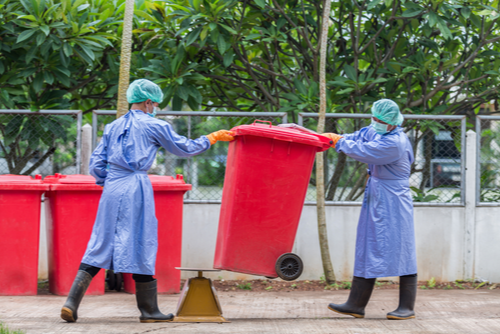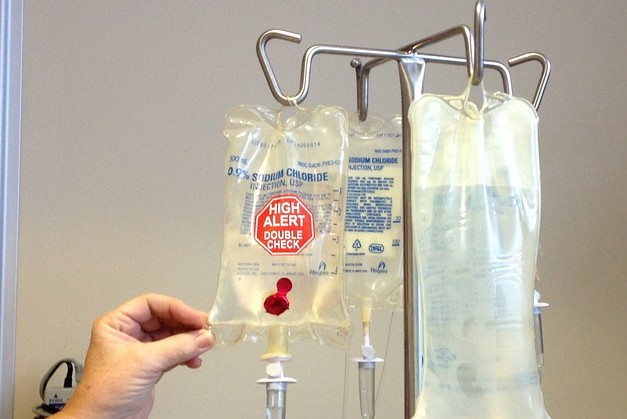Keep Ahead of Laws: Expert Advice on Medical Waste Disposal
In a globe where the health care industry is regularly progressing, it is essential for clinical facilities to remain ahead of laws when it concerns the correct disposal of clinical waste. With rigid guidelines and frequent regulatory changes, it can be challenging to navigate the intricacies of this procedure. With skilled suggestions, facilities can ensure conformity and mitigate risks connected with improper waste disposal. From understanding the different groups of medical waste to applying the best collection and partition methods, this conversation will certainly provide actionable tips and beneficial insights to assist facilities stay in advance of regulations in the ever-changing landscape of medical waste disposal.
Comprehending Clinical Waste Categories
Understanding clinical waste categories is crucial for correct disposal and administration in health care centers. Clinical waste describes any type of waste created by medical care activities that might position a threat to public wellness or the environment. It is important to categorize medical waste properly to ensure its risk-free handling, transportation, treatment, and disposal.
There are a number of categories of clinical waste that healthcare facilities need to be acquainted with. The most common groups include contagious waste, pathological waste, sharps waste, pharmaceutical waste, and chemical waste. Each group has certain standards and guidelines for its correct monitoring and disposal.
Transmittable waste consists of materials infected with blood or other physical fluids, such as handwear covers, gowns, and laboratory societies. Pathological waste describes human tissues, body organs, or body components that call for unique handling and disposal. Sharps waste consists of made use of needles, syringes, and various other sharp objects that can cause injury and transfer infections. Pharmaceutical waste consists of expired, extra, or polluted medicines that require careful handling and disposal. Last but not least, chemical waste consists of solvents, disinfectants, and various other chemical substances utilized in health care facilities.
Remaining Up-To-Date With Regulatory Changes
Remaining present with regulative changes is important for healthcare facilities to make sure conformity and correct administration of medical garbage disposal. medical waste removal service. With laws constantly advancing, it is crucial for medical care facilities to remain current to avoid charges, fines, and potential damage to the environment and public health and wellness
To stay in advance of regulative modifications, medical care centers ought to develop a system for tracking and tracking updates. This can be done by registering for regulative newsletters, attending workshops and seminars, and proactively getting involved in industry organizations. Additionally, centers must assign a personnel or group responsible for remaining notified and sharing details to relevant stakeholders.
Regular interaction with regulative firms is also crucial. Health care facilities need to develop connections with neighborhood, state, and federal agencies to ensure they are aware of any kind of modifications in regulations that may affect their waste administration practices. This can be done through regular conferences, engagement in public comment periods, and aggressive interaction with governing agencies.
In addition, health care centers should consider partnering with waste administration companies that focus on clinical garbage disposal (medical waste disposal services with WasteX). These companies are often fluent in the most current regulations and can offer assistance and support to ensure conformity
Applying Correct Collection and Partition Techniques
To efficiently handle clinical waste disposal, medical care facilities have to develop correct collection and partition techniques according to governing guidelines. Carrying out these approaches makes sure the risk-free handling and disposal of possibly unsafe materials, protects the setting, and decreases the risk of infections and injuries to health care employees and the basic public.
Proper collection and partition techniques include the browse this site usage of designated containers and identifying systems. Medical care facilities should provide clearly classified containers for various kinds of medical waste, such as sharps, contagious waste, pharmaceutical waste, and non-hazardous waste. These containers ought to be color-coded and clearly significant to prevent complication and advertise simple identification.
Additionally, healthcare centers must train their team on the proper treatments for gathering and setting apart medical waste. This includes informing them on the various kinds of waste, the ideal containers to use, and the importance of following guidelines and standards. Normal training sessions and correspondence course must be conducted to guarantee that personnel continue to be updated on best methods.
Moreover, health care centers ought to develop a system for normal collection and disposal of clinical waste. This might entail partnering with certified waste management business that focus on medical waste disposal. These business will certainly make certain that the collected waste is moved and gotten rid of in compliance with regulatory demands.
Picking the Right Disposal Methods

Incineration is just one of one of the most usual and efficient approaches for disposing of certain sorts of medical waste, such as pathological waste and sharps. It entails the controlled combustion of waste at heats, minimizing it to ash. However, incineration can release dangerous pollutants into the air and add to air pollution.

Various other disposal techniques consist of chemical treatment, microwave therapy, and landfilling. Chemical treatment includes using chemicals to decontaminate and reduce the effects of the waste. Microwave treatment makes use of microwave power to warm and sanitize the waste. Landfilling includes hiding the waste in an assigned land fill area (medical waste disposal services with WasteX). Landfilling should be the last hotel due to the prospective danger of contamination to soil and groundwater.
Ensuring Conformity Via Paperwork and Training
After meticulously thinking about the proper disposal methods for clinical waste, healthcare centers should make certain compliance with laws and lessen ecological influence by carrying out effective paperwork and training procedures. This action is critical in preserving a lasting and secure atmosphere for both healthcare workers and the general public.

Medical care workers that handle medical waste ought to obtain suitable training on waste segregation, handling, and disposal treatments. By offering thorough training, medical care centers can encourage their personnel to make enlightened choices and minimize the risk of incorrect waste disposal.
Verdict
To conclude, remaining in advance of policies in clinical waste disposal is vital for healthcare centers. medical waste removal near me. Comprehending the different groups of medical waste, staying upgraded with regulatory changes, executing appropriate collection and segregation approaches, choosing the suitable disposal methods, and ensuring conformity with documents and training are all vital steps. By adhering to these guidelines, medical care companies can successfully get rid of and manage of medical waste in a safe and liable manner
From understanding the different groups of clinical waste to executing the appropriate collection and partition techniques, this conversation will certainly supply workable pointers and valuable understandings to assist facilities stay ahead of policies in the ever-changing landscape of clinical waste disposal. - medical waste disposal services with WasteX
The most typical categories include infectious waste, pathological waste, sharps waste, why not look here pharmaceutical waste, and chemical waste. Healthcare facilities must offer clearly labeled containers for different kinds of medical waste, such as sharps, infectious waste, pharmaceutical waste, and non-hazardous waste. Health care facilities need to develop a thorough system to tape and track all facets of clinical waste disposal, including kinds of waste created, quantities, and disposal methods made use of. Medical care employees who handle medical waste ought to obtain ideal training on waste segregation, managing, and disposal procedures.